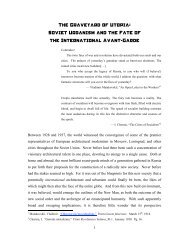MEMORIES OF THE FUTURE - The Charnel-House
MEMORIES OF THE FUTURE - The Charnel-House
MEMORIES OF THE FUTURE - The Charnel-House
Create successful ePaper yourself
Turn your PDF publications into a flip-book with our unique Google optimized e-Paper software.
Several years back, an odd injunction was thus issued: “Remember the future!” Whatthis meant was parsed as follows:In order to recognize [the] outstanding problems of capital we must remember the future whosehorizons of possibility informed the politics of the best traditions of revolutionary Marxism.Despite the limitations of Marxism as an historical movement, we nevertheless remain within thehorizon of the history of capital and its social effects, whether politics today recognizes it or not.Hence, apparently paradoxically, it is by recognizing the horizons of possibility of capital asrevealed in the past that we may recognize the limits humanity needs to overcome to realize itspotential, emancipated future. 62Incidentally, this is how Marx related to his own political moment in 1852. Reflecting onhis bitter disappointment with the 1848 revolutions, and now faced with the long night ofreaction that had set in, he observed that the bourgeois revolutions draped themselves inthe garb of the past. By the mid-nineteenth century, however, this repetition had becomefarcical. 63 Marx invoked the memory of the French Revolution of 1789, whose ambitionshad been so much loftier than those of his day, in order to add that “[t]he [modern] socialrevolution…cannot draw its poetry from the past, but only from the future.” 64Besides Berardi, there have been others who have detected the post-futurist characterof the present. Like him, they have registered the passing of the future in recent decades.Unlike him, they are not convinced that it is time to just have done with it, and maintainthat humanity cannot wipe its hands of the future once and for all. <strong>The</strong> gateway to thefuture resides in the past, and must be sought there.This is the task undertaken by the English architectural critic Owen Hatherley in histour de force debut, Militant Modernism. In its opening lines, Hatherley goes over someof the difficulties involved in “retracing” the development of the modernist movement,whose stated goal was to abolish its own necessity:62 Cutrone, Chris. “Remember the Future! A Rejoinder to Peter Hudis.” Platypus Review. № 8:November 2008. Pg. 3.63 “Hegel remarks somewhere that all facts and personages of great importance in world history occur, as itwere, twice. He forgot to add: the first time as tragedy, the second as farce. Caussidière for Danton, LouisBlanc for Robespierre, the Montagne of 1848 to 1851 for the Montagne of 1793 to 1795, the nephew forthe uncle.” Marx, Karl. <strong>The</strong> Eighteenth Brumaire of Louis Bonaparte. Translated by Clemens Dutt, et al.Collected Works, Volume 11: 1851-1853. (International Publishers. New York, NY: 1979). Pg. 103.64 Ibid., pg. 106.19






